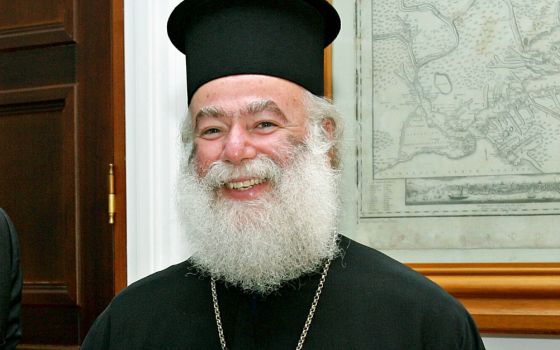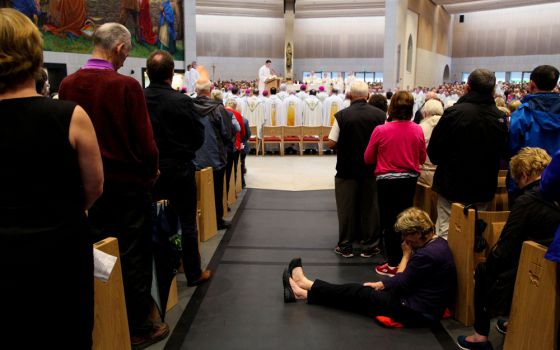As a permanent deacon in the Atlanta archdiocese, I was surprised to learn that Pope Francis may appoint a commission to look into the prospect of ordaining women as permanent deacons. "Permanent" deacons are mostly married men, and they do not continue on to priestly ordination as do "transitional" deacons.
The question of women in the permanent diaconate has been raised before. The proponents of this idea cited clear evidence that there were women deacons in the very early church. A study of the history of early church practices reveals, however, that the women deacons were not ordained via the "laying on of hands" as were the male deacons. Their role in the church was limited to assisting at the baptism of women and providing other services for women that were seen as improper for a man.
Male deacons, on the other hand, assisted at liturgies, distributed Holy Communion, preached and taught (as did St. Steven, one of the first deacons) and cared for the sick and the poor. As they do today, the first deacons had a three-fold ordained ministry of sacrament, word and charity.
A seemingly definitive judgment was published in 1994 by Pope John Paul II in an apostolic letter addressed to his brother bishops. In Ordinatio Sacerdotalis (On Reserving Priestly Ordination to Men Alone), John Paul II wrote: "The Church has no authority whatsoever to confer priestly ordination on women." He went on to direct that "this judgment is to be definitively held by all the Church's faithful." (End of discussion, period.) John Paul II said that the church has no authority, because it must follow the will of Christ alone, not the special sensitivities of the culture no matter how compelling that might be.
The apostles followed the Lord's example by only laying hands on men who were chosen for ministry in the churches as apostles, presbyters (priests) and deacons. When it came time to replace Judas as one of the Twelve, they chose a man, Matthias, "one of the men who accompanied them the whole time the Lord Jesus came and went among them" (Acts 1:21). When the church had grown such that help was needed in certain areas of administration, they laid hands on "seven reputable men, filled with the Holy Spirit and wisdom" (Acts 6:3).
Although there were women present in the group of disciples when the Holy Spirit came on the day of Pentecost, it was only Peter and members of the Twelve who preached and received converts on the streets of Jerusalem. There are many more examples, like Timothy, Titus, Barnabas, etc., in the New Testament. Though there were women helpers in the New Testament churches, they were never in the category of apostle, presbyter or deacon. This practice has been the consistent tradition of the church for almost 2,000 years.
This is why John Paul II said that "the Church has no authority whatsoever to confer priestly ordination on women." It is the will of Christ, it was the apostolic tradition, and it has been the unbroken tradition of the church from the very beginning. This is why the judgment in this matter is considered "definitive."
How do we know the will of Christ in this matter when the New Testament does not record any instructions concerning ordination (which was developed later in the history of the early church)? We know the will of Christ by the actions of Christ. He chose only men as his apostles -- those he would send out on the mission of the church, as the Father had sent him. To these men he said, "Go make disciples of all nations" (Matthew 28:19) and "Do this in remembrance of me" (Luke 22:19). The apostles and the generations of church leaders (bishops) after them continued this solid tradition.
So what about the concept of female permanent deacons? Is this a viable idea? Many will say that it is not, based on the historical perspective outlined above.
However, the practice of the church has changed in many ways over the centuries. Times change, cultures change, circumstances change and the needs of the church change over time. It was the apostles who decided to ordain deacons to fulfill the needs of the church of the first century. Would it be possible for the bishops to decide to ordain women as permanent deacons to fulfill its needs today? If they do, they will certainly break from tradition, but the church has broken from tradition before.
Jesus himself was a respecter of certain traditions, yet radically counter-cultural in other areas. He was much more interested in sincere love from the heart and the salvation of souls than simply following the letter of the law.
The church has traditionally ordained only men to the priesthood. The priest, unlike the deacon, stands "in persona Christi" in the celebration of the Eucharist, reconciliation and the anointing of the sick. The sacramental nature of the mistrial priesthood means that it is a "sign" that must make something or someone visible and present. That is what a sacramental sign does; it is a visible sign of God's invisible grace. A priest makes Christ present for the faithful sacramentally in the Eucharist, in confession, in the anointing of the sick. He also makes the bishop, who he is in union with, present. The bishop makes the apostolic ministry present. The apostolic ministry makes the authority of Christ present. These are all men.
It would be a misrepresentation of the sign if it were otherwise. It is clearly the will of Christ that this sacramental sign be preserved. "As the Father has sent me, so I send you" (John 20:21). In other words: "Go and be me to the world. Make me present to the church in all places and in all generations." Priests and bishops do this, not simply by their leadership roles; they do it sacramentally, as efficacious sacramental signs. The sacramental sign of Jesus the man and God the Son must be a man.
Though the deacon is a part of Holy Orders, he is not a part of the ministerial priesthood, and he does not stand "in persona Christi," as do priests and bishops. The deacon is instead ordained for service to the church under the direction of the bishop. He assists at Mass and preaches on occasion, he celebrates the sacrament of baptism, witnesses the sacrament of marriage, officiates at Christian funerals, leads other liturgies, teaches the faithful and performs works of charity.
He brings the church into the world of business, the family, the hospital, the prison and many other places where it might otherwise not go. The deacon is given certain sacramental graces, and the Holy Spirit works through him in a special way to affect the work of his ministry for the good of the People of God. Could the ordination of women to the permanent diaconate serve to enhance this ministry though the unique gifts that women can offer?
When I studied the philosophy of gender, I learned that men typically value and build things, while women value and build relationships. The church is all about relationships. The mission of the church is to help people everywhere develop and grow in an intimate loving relationship with God that spills out and over onto everyone they know and meet. Who better to nurture this relationship than women in the ministry of the permanent deacon?
This is a very intriguing and compelling question that the commission, the bishops and Pope Francis will hopefully consider in the months and years ahead. May the Holy Spirit continue to guide the bishops and Pope Francis for the ultimate good of souls.
[Gregory R. Ollick was ordained for the permanent diaconate of the Atlanta archdiocese in 2007. He earned a bachelor of arts degree in theological studies and a master's in theology at Saint Joseph's College of Maine.]

